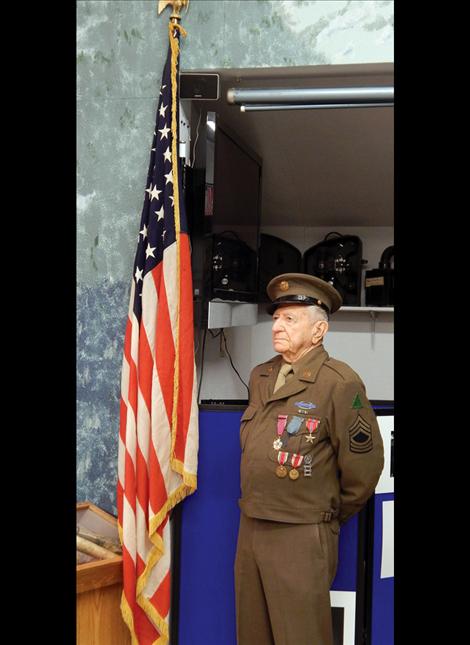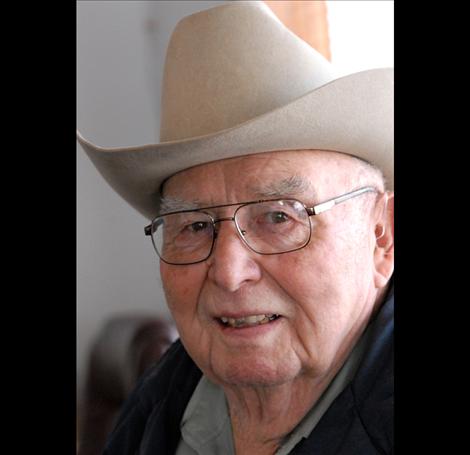Local men returned from World War II
Hey savvy news reader! Thanks for choosing local.
You are now reading
1 of 3 free articles.
While Memorial Day is a day to remember those Armed Forces soldiers, sailors, aviators and others who died in the service of the United State of America, maybe it’s also a good day to be glad some Montana men made it back.
Flick Riebe, a Polson man, was an operations sergeant in World War II. He served in the 363rd Regiment, 91st Division, Second Corps, Fifth Army in the Mediterranean Theater of Operations. Drafted at 19, Riebe went into the service at 20 and served until 1946.
“I feel sorry for the guy who doesn’t believe in the Lord,” he said.
He told of sending his wife and son home from Oregon just after he was drafted. He was standing alone in the bus depot, just standing and staring, when a feeling of relief and security came over him. Riebe said he knew it was the Lord.
“I never worried about my family or myself,” he said, although there were times he was scared or had some close calls, Riebe said.
He never did the job he was trained for; instead, he worked as an assistant warrant officer and kept phone lines open back to headquarters.
After some shelling and shooting, Riebe had been sitting on a ditch bank instead of in a foxhole when he looked down at the field telephone right beside him, and picked a three-inch piece of shrapnel out of the phone.
He still has the piece of shrapnel.
“The Old Boy was looking after me,” Riebe said, shaking his head.
One of Riebe’s sons served in Vietnam, and he has grandsons in the service. He’d recommend it as a career, he said.
“Right now,” Riebe said, “if a young man was a ‘loose ends’ right out of school, I’d advise him to join up in a hurry.”
It’s a great opportunity and a way to get an education, he added.
Paul Metzger served as a medic in the 71st infantry in 1945. Although he’s lived around Ronan a long time, Metzger grew up in western North Dakota, then his folks moved to Minnesota and then Little Rock, Ark.
Metzger shipped out of New Jersey into Le Havre, France, and saw his first action in France and continued all the way to Germany to the demarcation line President Franklin D. Roosevelt, Prime Minister Winston Churchill and Joseph Stalin decided on at Yalta.
The Bavarian countryside was just beautiful, Metzger said, but his infantry felt the black shadow of Nazism when they saw Hitler’s Eagle’s Nest, near the village of Oberzalberg on the German-Austrian border. Somewhere, Metzger still has a photo of himself standing in the window of Hitler’s empty house.
Just days before Victory in Europe day on May 8, 1945, which officially announced the end of World War II in Europe, Metzger’s infantry liberated a concentration camp in Austria called Gunskirchen Lager.
“There was a terrible smell,” Metzger said.
In “The Liberation of Gunskirchen Lager” a pamphlet produced by the United States Army, the smell was described as a combination of unwashed bodies, human excreta, smoldering trash fires, dank woods, dead bodies and mud.
“It could almost be seen and hung over the camp like a fog of death,” the pamphlet said.
Thousands of prisoners had been squashed into a few one-story buildings with dirt floors.
A man at the camp, a natural leader from Hungary, according to the book, said the people slept three deep on the floor, and there was one 20-hole latrine for the thousands of prisoners. The prisoners were the intellectual class of Hungarian Jews — doctors, lawyers, professors — who had been systematically starved, murdered indiscriminately, forced into unbelievable living conditions and turned into walking skeletons. Dead bodies littered the camp.
The 71st found a German storehouse of food about three miles from Gunskirchen Lager and set about feeding the prisoners. A starving person has to eat just a small bit at a time; if they gorge themselves, they will die.
“That was 69 years ago,” Metzger said. “You never want to remember.”
Since then, Metzger and his wife Ann spent 38 years near Ronan and raised three children — Brenda, Lonnie and Allen — while ranching with Angus cattle as the family business.

















